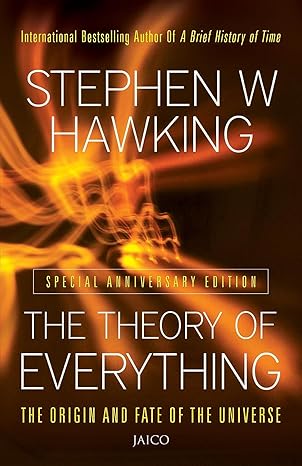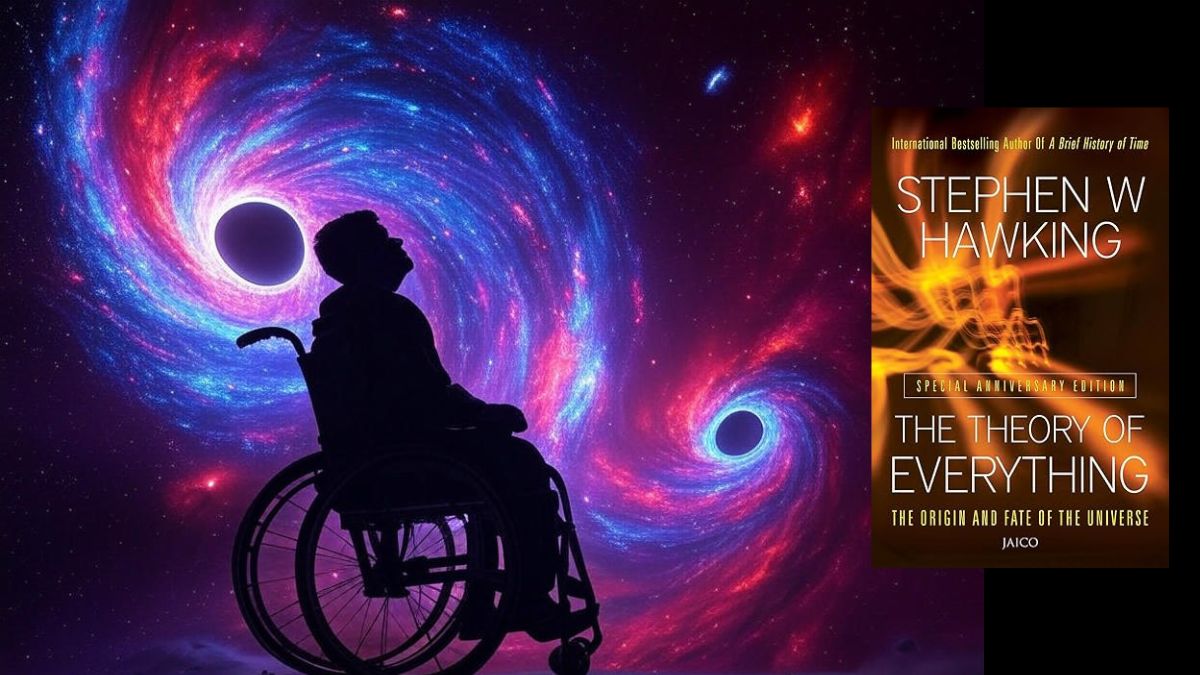Unlocking the Secrets of the Universe — From Black Holes to Big Bangs
In The Theory of Everything, Stephen Hawking delivers a mind-expanding journey through the cosmos, unraveling the mysteries of time, space, and the origins of our universe. Based on a series of seven lectures, this short yet powerful book distills decades of complex theoretical physics into language that is both understandable and awe-inspiring for non-scientists.
Whether you’re a science lover or a curious reader wondering about the beginning and end of time, Hawking’s insight offers a dazzling overview of the most significant discoveries in modern cosmology—presented in a way that fuels imagination and inspires questions about our place in the cosmos.

🔭What’s Inside This Book?
Hawking’s aim in The Theory of Everything is to take us on a chronological journey through the evolution of our universe. He begins with Aristotle’s ideas and takes us all the way through to Einstein’s General Theory of Relativity and beyond into quantum mechanics and string theory. The book breaks down some of the most abstract scientific theories and phenomena, such as:
- The Big Bang Theory: Hawking discusses how the universe might have started from an infinitely small point, exploding into the vast cosmos we see today.
- Black Holes: One of his most significant contributions to science, Hawking elaborates on black holes not just as dangerous voids but as sources of radiation and possible information storage.
- The Nature of Time: How time began, what it means for time to end, and how it might behave in different gravitational fields.
- Unification of Forces: The quest for a single theory that unifies general relativity and quantum mechanics—the elusive “Theory of Everything.”
🌌 Why You Should Read It
This book is not just a simplified version of theoretical physics—it’s a philosophical adventure into the nature of existence. Hawking has the unique ability to communicate the deepest aspects of our universe without overwhelming readers with equations. His humor, humility, and curiosity shine through as he discusses everything from Newton to quantum fluctuations.
The Theory of Everything is a must-read for anyone who wants to grasp the grand scale of the universe and the astonishing complexity of what lies behind the scenes. It’s a humbling reminder that despite all we’ve learned, there’s still so much more to discover.
🧠 Key Takeaways:
- Cosmology is for Everyone: Complex ideas like relativity and black holes can be understood with the right guide—and Hawking is the best.
- Science and Philosophy Are Connected: The book bridges the gap between empirical science and age-old philosophical questions about creation and destiny.
- We’re Just Getting Started: The book ends with optimism, encouraging further exploration into a unified theory of everything.
- The Power of Curiosity: Hawking’s personal story and resilience inspire us to keep questioning and learning, no matter our challenges.
❓Frequently Asked Questions (FAQs)
Q1: Is this book too technical for beginners?
Not at all. It’s designed for general readers and avoids heavy math, focusing instead on clear explanations and analogies.
Q2: What is the central idea of The Theory of Everything?
It’s a quest to find a single theory that explains all forces of nature—from gravity to quantum mechanics—in one framework.
Q3: Does the book cover Stephen Hawking’s own life?
Briefly. It touches on his personal struggles with ALS and how they shaped his scientific path.
Q4: Is it suitable for students?
Yes, especially those in high school or college who want an engaging introduction to cosmology and physics.
Q5: How is this different from A Brief History of Time?
This book is more concise and lecture-based, while A Brief History of Time dives deeper into the subjects with more detail.
👨🔬 About the Author
Stephen Hawking was one of the most brilliant theoretical physicists of our time. Diagnosed with ALS at 21, he overcame immense physical challenges to make groundbreaking contributions to cosmology, black hole theory, and quantum gravity. He was a professor at the University of Cambridge and the author of several bestselling books, including A Brief History of Time. Hawking combined scientific genius with wit, inspiring generations to explore the universe.

